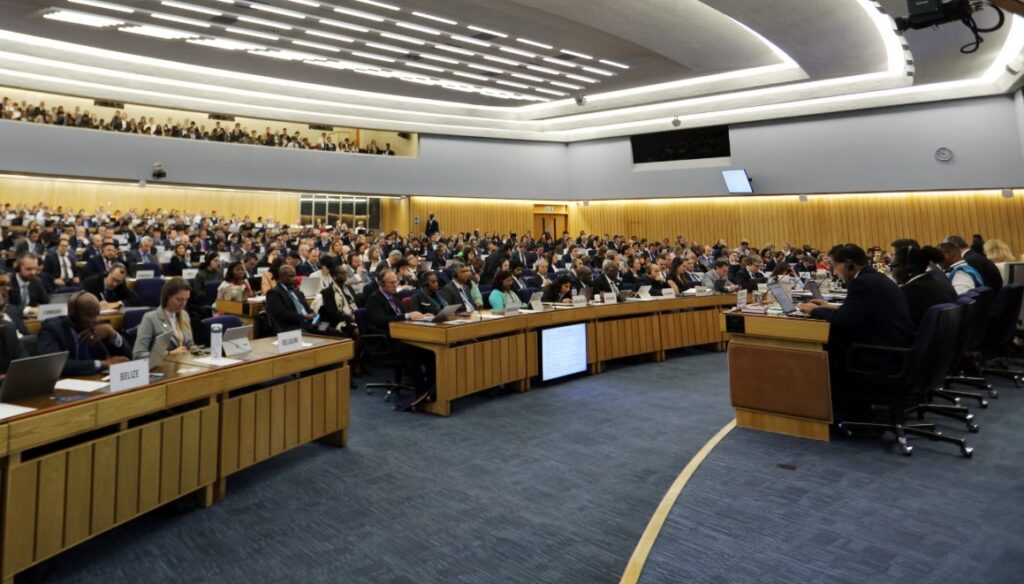
By Deborah Olaoluwa
Shipping Body Fails to Pass Historic Agreement that Could Have Eliminated One Billion Metric Tons of Carbon Annually by 2050
The International Maritime Organisation has failed to adopt the world’s first-ever global, legally binding carbon price—postponing for a year a vote on the measure at a meeting today in London.
The agreement would have required all large ships operating globally, including cruise ships, to reduce emissions by 17% by 2028—with increasing emission reduction targets thereafter—or pay a fee.
Currently, the global shipping sector relies on some of the dirtiest fossil fuels and accounts for 3% of global carbon emissions, polluting the ocean and imperilling the health of people in coastal areas.
Reactions to the International Maritime Organisation’s (IMO) failure to pass a strong climate agreement are varied, with some welcoming it as a positive development, while others are overwhelmingly negative, citing a lack of urgency and accusing some member states of obstructionism.
Environmental groups, island nations, and some European countries expressed disappointment, noting that the delay jeopardises climate goals and the transition to green fuels.
Industry groups, such as the International Chamber of Shipping (ICS), acknowledged that the agreement was imperfect but still viewed it as a stepping stone, while some nations, particularly those heavily reliant on fossil fuels, have been accused of blocking progress.
In a swift response, Delaine McCullough, Ocean Conservancy’s shipping programme director, affirmed that “the failure of IMO member states to clinch this agreement is a major setback for people and the planet. It’s disgraceful that climate action has been delayed when we see the devastating impacts every day, and when shipping fuels have been tied to 250,000 premature deaths and 6 million cases of childhood asthma every year.”
“The agreement would have required ships across the globe to slash their greenhouse gas emissions, driving a sector-wide switch from dirty fossil fuels to zero-emission options, including harnessing the power of wind to traverse the ocean and running on new fuels produced from 100% renewable energy. The agreement would have slashed carbon emissions and saved lives. A world without this agreement is dirtier and more dangerous for people, wildlife and the ocean,” he said.
“While the agreement was not perfect, it was an important step to deliver on the IMO’s commitment and send clear signals to an industry that was not only asking for a global framework, but actively supported this deal,” McCullough added.
While this delay is a significant setback, experts believe it presents a major opportunity to put the sector on a zero-emission pathway.
Thomas A. Kazakos, International Chamber of Shipping Secretary General, made clear that what the sector needed was clarity on future regulations and therefore the delay would not help the wider shipping industry.
“We are disappointed that member states have not been able to agree a way forward at this meeting. Industry needs clarity to be able to make the investments needed to decarbonise the maritime sector, in line with the goals set out in the IMO GHG strategy. As an industry we will continue to work with the IMO, which is the best organisation to deliver the global regulations needed for a global industry,” he said.
Kostas Gkonis, Secretary General of INTERCARGO shared one of the more positive reactions, saying the delay was “an opportunity for further dialogue” and restating the association of dry bulk ship owners’ commitment to the IMO. This was a heavy hint that INTERCARGO does not want to see the fracturing of regional regulations that some are worried may follow the adjournment.
“Following IMO’s decision regarding the Net Zero Framework, INTERCARGO reaffirms its support to the IMO as the sole global regulator capable of delivering coherent and effective measures for international shipping. We wish to see the current postponement as an opportunity for further dialogue. The time ahead should be used constructively and effectively to bridge differing positions among IMO Member States and to also ensure that the industry’s voice and input are heard and taken onboard.
In April 2026, the IMO will continue revising its main energy efficiency measure, the Carbon Intensity Indicator (CII), which aims to reduce fuel burn through technical and operational measures, such as slowing ships down. Strengthening the CII is absolutely critical to immediate emission reductions, necessary to meet the IMO’s 2030 goals.”











